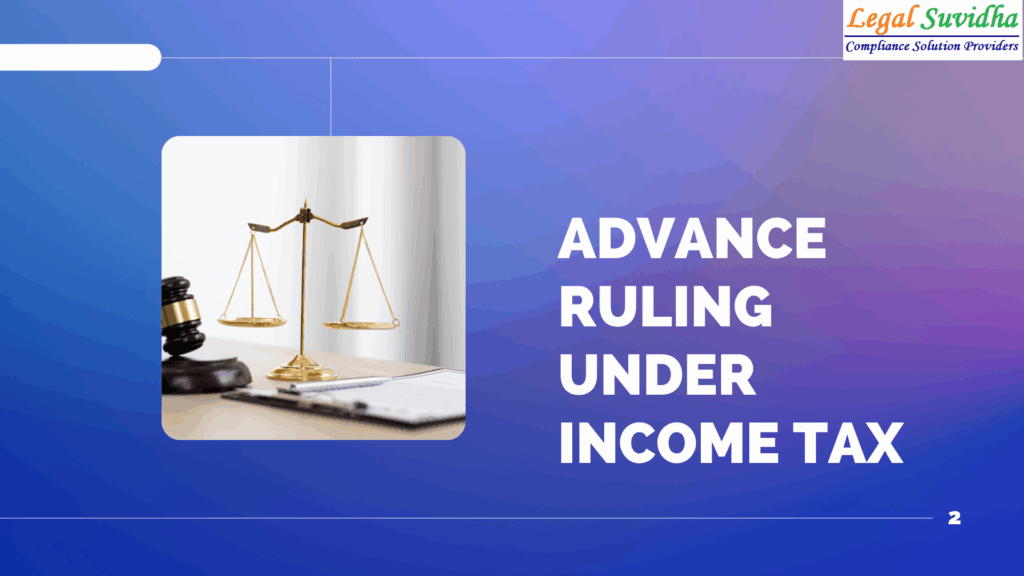INCOME TAX ADVANCE RULING: MEANING AND PROVISIONS
A resident taxpayer may have some taxation issues in respect of a transaction which has been undertaken or proposed to be undertaken with a non-resident. Similarly, a non-resident may have some taxation issues in respect of transaction which has been undertaken or proposed to be undertaken by him in India. In order to get clarification on taxation of those transactions, a person can make an application to the Authority for Advance Rulings (‘AAR’). Provisions relating to advance ruling are provided in sections 245N to 245V.
What is the meaning of advance ruling?
Section 245N(a) gives the definition of ‘advance ruling’. As per section 245N(a) “Advance Ruling” means :
- A determination by the AAR in relation to a transaction which has been undertaken or is proposed to be undertaken by a non-resident applicant.
- A determination by the AAR in relation to the tax liability of a non-resident arising out of a transaction which has been undertaken or is proposed to be undertaken by a resident applicant with such non-resident.
- A determination by the AAR in relation to the tax liability of a resident applicant, arising out of one or more transaction valuing Rs.100 crore or more [vide Notification No. 73/2014, dated 28-11-2014] in total which has been undertaken or is proposed to be undertaken by such applicant and such determination shall include the determination of any question of law or of fact specified in the application.
- A determination or decision by the AAR in respect of an issue relating to computation of total income which is pending before any income-tax authority or the Appellate Tribunal. It shall include the determination or decision of any question of law or of fact relating to such computation of total income specified in the application.
- A determination or decision by the AAR whether an arrangement, which is proposed to be undertaken by any person being a resident or a non-resident, is an impermissible avoidance arrangement as referred to in Chapter X-A. [Chapter X-A contains provisions relating to General Anti-Avoidance Rule (GAAR)].
What is the meaning of Applicant?
The application for advance ruling can be made by an applicant as defined in section 245N(b). As per section 245N an ‘applicant’ would mean the following:
- A non-resident who has undertaken or proposes to undertake a transaction in India.
- A resident who has undertaken or propose to undertake one or more transactions of value of Rs.100 crore or more in total[vide Notification No. 73/2014, dated 28-11-2014] A resident falling within notified class or category of persons (presently includes public sector companies).
- Any person (resident or non-resident) making an application for determining whether an arrangement, is an impermissible avoidance agreement as referred to in Chapter X-A (applicable from 1-4-2015).
In Union Budget 2017, the Government had decided to merge the Authority for Advance Ruling (AAR)# for income-tax, central excise, custom duty and service tax. Hence, the meaning of ‘applicant’ is expanded with effect from 1/4/2017 to include-
1. An applicant as defined in section 28E(c) of the Customs Act, 1962;
2. An applicant as defined in section 23A(c)of the Central Excise Act, 1944;
3. An applicant as defined in section 96A(b) of the Finance Act, 1994 The Finance Act, 2021 has amended provisions of section 245N(b) to provide that above three points shall be omitted with effect from such date as appointed by the Central Government by notification in the Official Gazette.
Certain circumstances in which the application cannot be allowed
In following circumstances the application is not allowed by the AAR:
when the question raised is already pending before any income-tax authority or appellate tribunal or any Court. However, exception will apply in the case of a resident applicant falling within the notified class or category of persons i.e. a public sector company.
when the question involves determination of fair market value of any property.
when the question relates to a transaction which is designed prima facie for the avoidance of income-tax. Exception to this provision: (i) resident taxpayer falling within notified class or category of persons i.e. a public sector company and (ii) Any person (i.e., resident or non-resident) making an application to determine whether an arrangement proposed to be undertaken is an impermissible avoidance arrangement under Chapter X-A.










